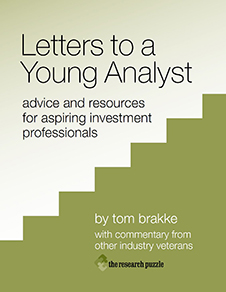
- Tuesday, October 8th, 2013
- something better
-
The last two postings have looked at “the paradox of choice” at work in the world of investment products. The first sketched out a couple of basic principles from the book with that titlethe research puzzle | It was authored by Barry Schwartz. and the sequel gave some advice about how to proceed as a buyer of such products given the overwhelming number of offerings from which you could choose.the research puzzle | I called the search for good active managers “this most difficult game.”
Now we turn our attention to the creators and managers of products and what they should do to succeed in this very competitive environment. An important question must be addressed first: How much is the market for investment products going to change over the next five, ten, or twenty years?
Despite the mountain of evidence that would argue for taking a passive approach to investing, most asset owners still invest predominantly with active managers. Supplying those actively-managed products has been a lucrative business, even for firms where the products themselves haven’t performed very well over time. Just staying in the game by not sticking your neck out has proven to be a successful business strategy. If nothing much changes in how the industry operates, continuing as before might work just fine.
But I think the odds are against that being a tenable strategy.
Yes, people in the future will still chase performance, so riding the waves of relative performance noise will allow a firm to add assets when it happens to end up on the right side of the index for a while, although it will lose them when it is not. Good luck with that as a path to excellence.
Instead, asset managers must focus more on differentiation. Everyone says that they are different, but how many firms really are? If you have been at a presentation of mine (or are a client), you’ve heard me ask over and over again: “Same as” or “different than”? If you can’t identify the differences in what you do from what others do, you have a major problem.
In Margin Call, the Jeremy Irons character says, “There are three ways to make a living in this business: be first, be smarter, or cheat.” What’s your formula for success? (Hopefully it doesn’t involve cheating.) Do you have better ideas, better information, better methods, better analysis, better behavior, or something else? What is different about what you do?
By definition, you don’t get alpha unless you’re willing to do something differently — specifically, something better. Yet across much of the investment industry, there is a remarkable sameness in how organizations are structured and how decisions are made. To stand out in a world awash in products means taking some risks in your approach.
The same goes for communicating about what you do. Sit through a few manager presentations and it might not be easy to distinguish one from another. The pitch books are structured the same, the messages are the same, the diagrams of process are the same, etc.the research puzzle | When I give talks about communicating investment process in an effective manner, the standard pictures of process are instantly recognizable to the attendees. Effectively communicating the differences in what you do and how you do it is never particularly easy, but if there are no real differences you obviously can’t do it at all.
One aspect of the paradox of choice is that the purchases in which we invest the most time and emotion often are those which disappoint us most acutely as reality sets in. The buyer of an investment product may come out of the selection process with high hopes, but the historical performance that charmed him will soon give way to the actual performance that will be his to keep. If that was the hook — the difference — that mattered, then everything will be about that.
Which is why asset managers need to take risks on the communications front too. It is natural to try to put your best foot forward to win the business and to keep it. But if that inhibits true understanding of who you are and what you do — presenting a stylized version of your firm rather than an honest, revealing, transparent, real one — it won’t help you much in the end.
When it comes to investment process and how they talk about it, asset managers need to do something different. (Something better.)
